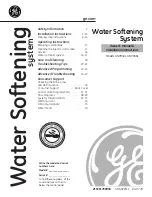
Cryo-Torr High-Vacuum Pump Installation, Operation and Maintenance Instructions
P/N 8040613
4-1
C
HELIX TECHNOLOGY CORPORATION
-
TI
CRYOGENICS
Section 4 - Troubleshooting
Troubleshooting the Cryopump
The primary indication of trouble in a vacuum pumping system is a rise in
base pressure in your vacuum chamber. A rise in the base pressure may be
caused by a leak in the vacuum system or by a fault in the cryopump or
saturation of the 15K cryo-adsorbing charcoal array (regeneration may be
necessary). If the cryopump temperature is below 20K it must pump at
rated capacity; a high base pressure is usually caused by an air-to-vacuum
leak in the system.
If you suspect a leak in your vacuum system, isolate the cryopump by
closing the Hi-Vac valve and leak check your vacuum chamber. If no leaks
are found, a leak may be present below the Hi-Vac valve (cryopump). Leak
checking below the Hi-Vac valve should be performed with the cryopump
shut OFF and at room temperature. Leak checking while the cryopump is
operating may mask leaks that are present (due to the ability of the
cryopump to pump helium). If no leak is found, refer to the cryopump
troubleshooting procedures summarized in Table 4-1.
The problems presented in Table 4-1 are followed by possible causes and
corrective actions. The causes and corresponding actions are listed in their
order of probability of occurrence.
Maintaining a log of certain parameters during normal operation can be a
valuable tool in troubleshooting the cryopump. The log may contain many
parameters, however, the following minimum parameters should be
included: the cooldown time to 20K, the roughing time to 50
µ
, the time to
base pressure at crossover, the time between regeneration cycles, and the
compressor pressure reading.
Technical Inquiries
Please refer to Appendix A of this manual for a complete list of the
CTI-CRYOGENICS’ world wide customer support centers.












































